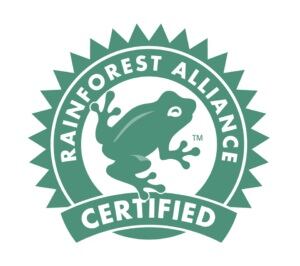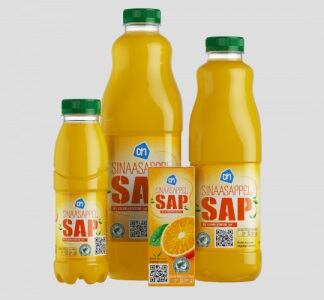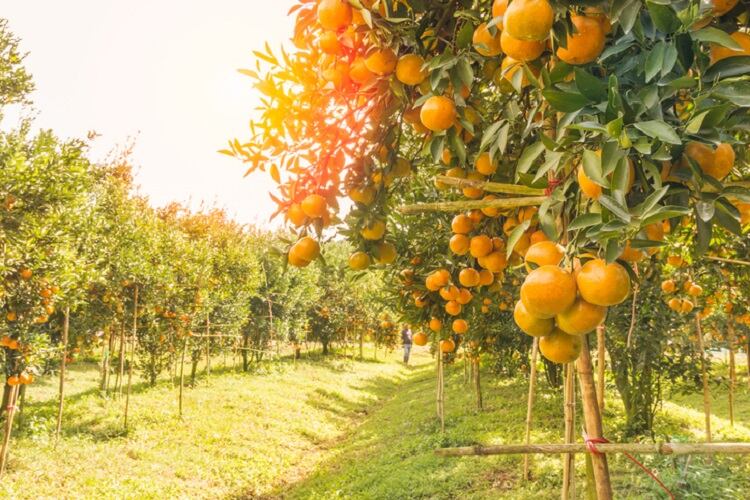Blockchain is an open and secure digital ledger that enables a permanent record of transactions.
The technology has been leveraged by a great number of industries, from pharmaceuticals to finance – most famously used by cryptocurrency Bitcoin – to ensure security and promote consumer trust.
Now Dutch supermarket Albert Heijn (AH) is tapping the technology for its own brand of orange juice. By scanning a QR code on AH’s orange juice packaging, consumers can see the route the oranges have travelled, from farm to supermarket shelf.
An AH smartphone app also allows consumers to check the percentage of oranges that come from each of its supplier’s 25 Rainforest Alliance Certified plantations in Brazil, when they were harvested, and their degree of sweetness.

“We wanted to combine…safety, health and sustainability…for the customer,” said AH senior director of quality assurance and product sustainability, Anita Scholte Op Reimer, at the Global Food Safety Initiative (GFSI) conference in Nice, France this week.
“We care about our consumers, and what they think of this product and the supply chains that…bring the product to our shelves.”
Why orange juice?
Beginning with the farmer, AH’s orange juice supply chain also comprises the processor, cold storage unit, bottler, and retailer.
“The oranges are picked, then the concentrate made has to be shipped – it is an international supply chain. When it arrives at [bottling firm] Refresco in the Netherlands, it is again processed and then goes to our warehouses and into our stores,” explained Scholte Op Reimer.
“It is not such an easy supply chain. We thought blockchain would be a good solution because [the supply chain is] complicated.”

In addition, the technology allows for both the manufacturers’ concerns and customers’ interests – which are not always the same – to align.
Primary risk areas in orange juice production, according to AH, include forced labour and excessive working hours, wages (when lower than the minimum and living wage), health and safety of workers, excessive use of agro-chemicals, and deforestation and loss of habitat.
The consumer, however, is predominantly interested in where the oranges come from, when they were picked and from which fields, how the juice is produced, and how sweet it tastes.
Blockchain offers the best of both worlds. “The journey of the orange is the journey that brings all these [elements] together,” said Scholte Op Reimer.
A collaborative effort
The project, which took just five months to implement, is the product of a collaboration between retailer AH, orange supplier Louis Dreyfus Company (LCD) Juice, bottling firm Refresco, and technology partner Supply Chain Information Management (SIM).
While the blockchain ledger incorporates data from each stakeholder, Scholte Op Reimer stressed that the data remains with each party. “We haven’t created a big new database. Before the whole process, we agreed what data is there – because not all data is digitally available – [and] that everyone would upload their data.”
Trust in its partners was crucial to the project’s success. “Only people make technology work. Blockchain will never run without trust,” we were told.
Moreover, each party must stand to gain, she continued. “All have to benefit. It wouldn’t have worked if Refresco [for example] couldn’t [use the project to] show the industry that they are a trustworthy partner.”
Telling an ‘amazing story’
Rather than focus on the food safety and quality aspect of its orange juice product, AH has taken the opportunity to push the sustainable, transparent and healthy aspects of its supply chain to consumers.
Albert Heijn's orange juice story
‘A healthy and tasty orange juice, originating from 25 carefully selected sunny RFA certified plantations in the ‘citrus belt’ region in Brazil, meeting the highest quality and product safety standards, grown sustainably with care for an in harmony with the environment, while fair income and good labour conditions are guaranteed for all workers involved.’
“Our sustainable orange juice comes from Rainforest Alliance (RFA) Certified farms. This means that farmers must follow more sustainable farming methods that help to protect the environment, nature [and working conditions],” Scholte Op Reimer told delegates.
“We congratulate Albert Heijn on introducing this orange juice for which Rainforest Alliance certified oranges were grown. It is good that so many consumers are able to enjoy orange juice that contributes to improving the environment and the future of orange grove keepers and their families,” said Rainforest Alliance CEO Han de Groot in a statement last year.
“An ever-increasing number of consumers want to have information about where their food is coming from and how it’s made, and it is, therefore, wonderful that Albert Heijn clients can follow the route of their orange juice. We encourage other parties to follow this example.”
This story extends across the entire supply chain. “Customers can see when the product arrived at LDC Juice and when it was concentrated, also when it was shipped from Brazil to Ghent in Brazil…you can see all the dates of production… This is all visible for our customers within the app,” said Scholte Op Reimer. “I think we tell an amazing story by doing this.”
In the age of social media and digital communication, AH has used blockchain to take the project full circle.
On the app, a ‘Like2Farmer’ function allows consumers to send messages directly to the 8,000 fruit pickers working across LDC Juice’s 25 groves. The messages are displayed on television screens in the buses that take the workers to the plantations.
“The messages I have sent have been ‘Thank you for this tasty orange juice’, or ‘I hope you have a lovely day’,” said Scholte Op Reimer.
“This is really connecting the customers to the farmers in Brazil. We are really closing the circle and bringing that connection back to the farmers.”
While the high number of consumers using the app when the project first launched – which counted in the thousands – has since reduced to “a stable base”, the company continues to see value in the project.
“We [both] tell the story to the customer and [make] sure that the oranges were safely produced…[with] no fraud in the supply chain.”
AH is also running a blockchain project for eggs, with plans to expand the systems to incorporate additional products. “We haven’t decided which ones yet, we want to do a proper analysis of where it will best make the best impact,” said Scholte Op Reimer.



